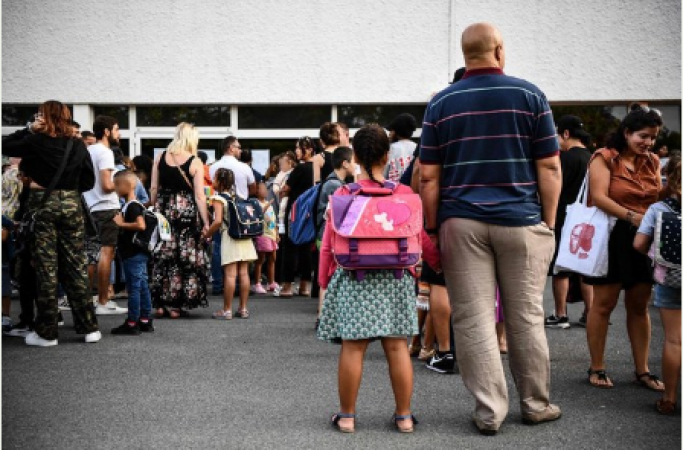
Paris: As the new academic year begins in France, a contentious policy has taken center stage: a ban on students wearing abayas, the long, loose-fitting garments worn by some Muslim women. This ban has ignited a heated debate, questioning the boundaries of secularism in France and the fundamental right to religious freedom.
The decision to impose the ban was made by the Ministry of Education, asserting that the abaya is a religious symbol incompatible with the secular values of the French Republic. The ministry argues that the ban is essential to ensure equal treatment of all students and to prevent anyone from feeling marginalized due to their religion.
Reactions to the abaya ban have been diverse. Some view it as a necessary measure to safeguard secularism, while others perceive it as an encroachment on religious freedom. The French Council of the Muslim Faith, the nation's largest Muslim organization, categorizes the ban as "discriminatory" and "unacceptable."
Also Read: India Unveils 2023 ODI World Cup Squad: No Surprises in 15-Member Provisional Team
This recent debate over the abaya ban is merely the latest in a series of conflicts between secularism and religious freedom in France. In recent years, the French government has prohibited the niqab, a face-covering veil, in public spaces. Additionally, it has imposed restrictions on the construction of new mosques and the funding of religious groups, all in the name of protecting the republic's secular values. However, critics argue that these measures are discriminatory and infringe upon the right to religious freedom.
The abaya ban is poised to remain a contentious issue in France, raising crucial questions about the role of religion in public life. Below, we delve into the arguments both for and against the abaya ban.
Arguments in Favor of the Abaya Ban:
Preserving Secular Values: Proponents of the ban assert that the abaya is a religious symbol that clashes with the secular principles upon which the French Republic is founded. They argue that secularism necessitates the separation of religion from public institutions and spaces, including schools.
Ensuring Equality: Advocates contend that the ban serves to maintain a level playing field for all students, irrespective of their religious beliefs. They argue that by prohibiting religious symbols like the abaya, no student is singled out, and there is no risk of anyone feeling excluded based on their faith.
Protecting French Identity and Culture: Some supporters argue that the abaya ban is a vital step in safeguarding French identity and culture. They assert that upholding secularism helps preserve the nation's distinct values and heritage.
Also Read: The U.S. cities with the highest population
Arguments Against the Abaya Ban:
Violation of Religious Freedom: Critics vehemently assert that the ban infringes upon the fundamental right to religious freedom. They argue that individuals have the right to express their faith through clothing and that the state should not dictate what religious attire is permissible.
Alienation of Muslim Students: Opponents worry that the ban will have the unintended consequence of alienating Muslim students. They argue that such policies can make students of minority religious backgrounds feel marginalized and stigmatized.
Islamophobia Concerns: The ban has also been decried as a form of Islamophobia, with critics contending that it unfairly targets Muslim individuals and contributes to a climate of discrimination.
The future of the abaya ban in France remains uncertain. It is possible that the ban may be legally challenged, and there is also the prospect of the French government reconsidering its stance. Ultimately, the resolution of this debate hinges on the delicate balance between secularism and religious freedom in France.
The Broader Context: Secularism in France
To comprehend the controversy surrounding the abaya ban, it is crucial to contextualize it within the broader landscape of secularism in France. Laïcité, the French concept of secularism, emphasizes the strict separation of religion from public life. It has deep historical roots in the country, dating back to the French Revolution.
Over the years, France has enacted various laws and policies aimed at maintaining this separation. While proponents argue that these measures are essential for upholding the core values of the republic, critics contend that they disproportionately target religious minorities, particularly Muslims.
The debate over secularism and religious freedom is not limited to clothing but extends to issues such as religious symbols in schools, religious practices in public spaces, and even the funding and construction of religious institutions. These debates underscore the complex and often contentious relationship between religion and the state in France.
Also Read: First Lady Jill Biden Tests Positive for COVID-19; President Biden Tests Negative
The abaya ban in French schools is emblematic of the ongoing struggle to reconcile secularism and religious freedom. It is a multifaceted issue that demands careful consideration of the rights and beliefs of all individuals in a diverse society.
As the debate unfolds, France finds itself at a crossroads, tasked with finding a delicate balance between preserving its secular heritage and respecting the religious freedoms of its citizens. The outcome of this debate will not only shape the future of religious expression in France but also serve as a litmus test for the global conversation on secularism and religious freedom in an increasingly diverse and interconnected world.